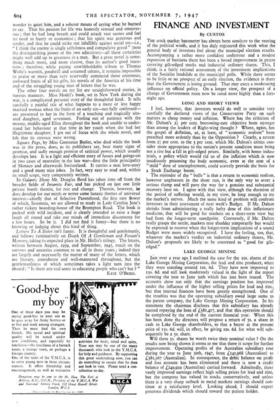FINANCE AND INVESTMENT
By CUSTOS
THE stock market barometer has always been sensitive to the veering of the political winds, and it has duly registered this week what the general body of investors feel about the municipal election results. Accompanying a rather more confident undertone and a modest expansion of business there has been a broad improvement in prices covering gilt-edged stocks and industrial ordinary shares. This, I think, is a fairly rational assessment of the investment implications of the Socialist landslide at the municipal polls. While there seems to be little or no prospect of an early election, the evidence is there that the Government is losing ground. That may exert a moderating influence on official policy. On a longer view, the prospect of a change of Government must now be rated more highly than a fort- night ago.
LONG AND SHORT VIEWS I feel, however, that investors would do well to consider very carefully the declared views of the Conservative Party on such matters as cheap money and inflation. Where has the criticism of Mr. Dalton's 21 per cent. borrowing-rate objective been stronger than among the leaders of Right-wing thought ? Where, again, has the gospel of deflation, or, at least, of " economic realism" been preached more ardently than by tbe Opposition ? Clearly, a retreat from 21 per cent. to the 3 per cent. which Mr. Dalton's critics con- sider more appropriate to the nation's present condition must bring not a rise but a fall in gilt-edged prices. Similarly, with home indus- trials, a policy which would rid us of the inflation which is now insidiously poisoning the body economic, even at the cost of a " mild " dose of unemployment, could scarcely provide the basis for a Stock Exchange boom.
The rejoinder of the " bulls " is that a return to economic realism, however unpleasant in the short run, is the only way to avert a serious slump and will pave the way for a genuine and substantial recovery later on. I agree with that view, although the duration of the period of suffering would, in my view, be long enough to try the market's nerves. Much the same kind of problem will confront investors in their assessment of next week's Budget. If Mr. Dalton shrinks from administering a really hefty dose of this inflationary medicine, that will be good for markets on a short-term view but bad from the longer-term standpoint. Conversely, if Mr. Dalton really grasps the nettle, markets may shudder temporarily but would be expected to recover when the longer-term implications of a sound Budget were more widely recognised. I have the feeling, too, that, whatever the market's verdict on industrial ordinary shares, Mr. Dalton's proposals are likely to be construed as " good for gilt- edged."
LAKE GEORGE MINING
Just over a year ago I outlined the case for the los. shares of the Lake George Mining Corporation, the lead and zinc producer, when they were standing around ios. 6d. They have now improved to 15s. 6d. and still look moderately valued in the light of the report covering the year to June 3oth which has just been issued. The accounts show not only that the earnings position has improved under the influence of the higher selling prices for lead and zinc, but that internal finances have been greatly strengthened. One of the troubles was that the operating subsidiary owed large sums to the parent company, the Lake George Mining Corporation. In his statement the chairman discloses that this subsidiary has already started repaying the loan of £581,417, and that this operation should be completed by the end of the current financial year. When this has been done the directors will propose a return of 5s. a share in cash to Lake George shareholders, so that a buyer at the present price of 15s. 6d. will, in effect, be giving los. 6d. for what will sub- sequently be a 5s. share.
Will these 5s. shares be worth twice their nominal value ? On the results now being shown it seems to me that there is' scope for further improvement. Operating profits of the Australian subsidiary rose during the year to June 3oth, 1947, from £141,968 (Australian) to £381,567 (Australian). In consequence, the debit balance on profit and loss account has been eliminated and there is now a credit balance of £240,920 (Australian) carried forward. Admittedly, these vastly improved earnings reflect high selling prices for lead and zinc, but the company has valued its stocks conservatively, and unless there is a very sharp setback in metal markets earnings should con- tinue at a satisfactory level. Looking ahead, I should expect generous dividends which should reward the patient holder.


































 Previous page
Previous page